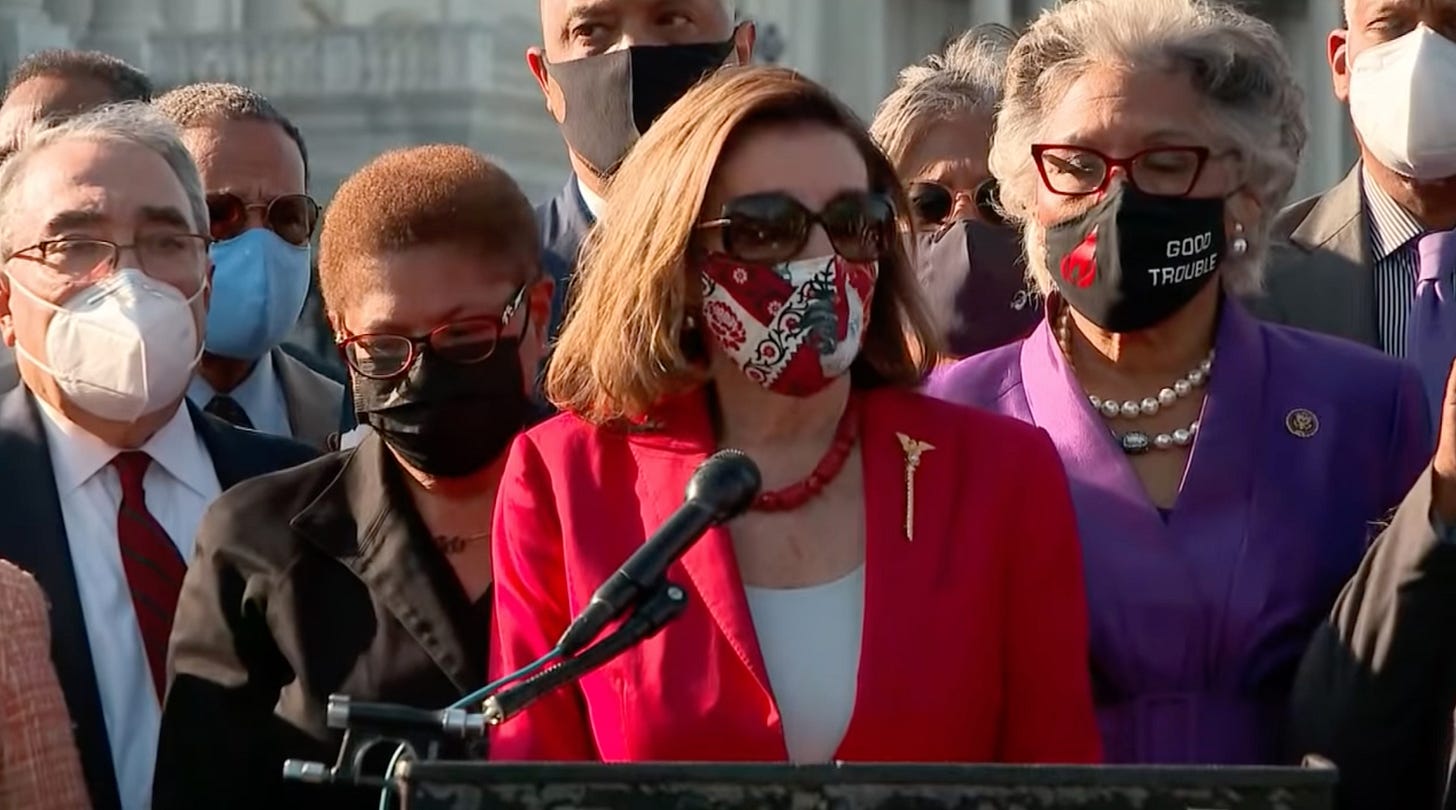The Obscenity of Nancy Pelosi's George Floyd Comments
Her attempts to turn George Floyd into a willing martyr for America were symbolic of a destructive kind of liberalism.
It's been a day since Derek Chauvin was convicted for the murder of George Floyd, and I can't get Nancy Pelosi out of my head.
In case you missed it, Pelosi reacted to the news that Chauvin had been declared guilty of Floyd's murder by thanking Floyd for getting killed. Here are the relevant comments, courtesy of my Discourse Blog colleague Katherine Krueger, who wrote them up on Tuesday:
“Thank you, George Floyd, for sacrificing your life for justice. For being there to call out to your mom—how heartbreaking was that—call out for your mom, ‘I can’t breathe.’ But because of you, and because of thousands, millions of people around the world who came out for justice, your name will always be synonymous with justice.”
Pelosi, flanked by members of the Congressional Black Caucus, looked up to the heavens as she said these words.
Every time I read the transcript, I get mad all over again. Pelosi's comments are nothing less than an obscenity, a sin against Floyd's memory. They are, quite possibly, some of the most repugnant comments I've heard from a politician in my lifetime. More troublingly, they are a symbol of a kind of white liberalism that appears eager to use Floyd as a character in a story of national renewal, rather than to confront the reality that he was something far more ordinary and tragic—a regular person who was murdered by the state because he was a Black man in a white supremacist country.
It is hard to overstate how offensive Pelosi's remarks are. "Thank you, George Floyd, for sacrificing your life for justice." The mind reels. He had his life snuffed out of him by a police officer. There was no sacrifice involved. Sacrifice is when you willingly give something up. Floyd's life was taken from him by force. "For being there to call out to your mom—how heartbreaking was that—call out for your mom, ‘I can’t breathe.’" Again, how could someone say this? To thank someone for struggling as the breath from his body was taken away? To pat someone on the back for crying out for his mother as he was murdered?
It is patently repulsive, but think further and there is a deeper meaning that is even worse. The implication here is that Pelosi is glad that Floyd went through his journey to death in a way that made it possible for the Nancy Pelosis of the world to rally around him. He did not fight back too much, he displayed human feeling—in short, he became a good sort of victim. He said the right words. He died the way he should. And because of that, he became an appropriate martyr for the nation. He became someone to build a tidy narrative around—a classic American liberal narrative of sin and redemption. He was murdered, but didn't something good come out of it?
This was the message behind several other reactions to the guilty verdict. Minneapolis Mayor Jacob Frey declared that Floyd had made things better for his city:
Former Obama honcho David Axelrod went even further, in a tweet he wound up deleting:
"A nation can breathe again." Genie, you're free.
All three of these statements are pointing to the same place: a country that falls down but gets back up again, a country that strays from the light but finds its way out of the darkness. A country, in other words, where not much needs to change. It was fitting that anonymous Democrats joined their Republican counterparts on Tuesday to tell Axios that the verdict had lessened the pressure for real policing reform (or, more accurately, for whatever half-measures they want to sell us as reform). Hadn't America just shown that, if one cop knelt on a man's neck for nearly 10 minutes, and someone happened to film it, and an international protest movement had erupted in response, and the cop's actions were so obviously monstrous that even the police establishment decided that it had to cut him loose, and there were mountains of evidence to show that he was responsible for the man's death, that he could be convicted in a jury trial? What more do you need to know about the way the system can do the right thing?
We know, though, that, as Rafi Schwartz wrote today, the system has to do the "right" thing sometimes in order to preserve its legitimacy. We know that the movement that Pelosi pretended to find so worthy of praise was brutally repressed across the country by Democratic politicians with not a hint of protest from Pelosi and her allies. We know that governments across the country were preparing to roll out a massive police response in case the verdict on Tuesday had gone the other way, because in America, you are supposed to be slapped in the face by injustice and then punched in the gut by the state for daring to be angry about it.
We know that, even as the Chauvin verdict was coming in, police in Columbus, OH, killed a 16-year-old Black girl, Ma’Khia Bryant. We know that police killed three people a day in America during the Chauvin trial.
This is what we are dealing with. It is a far cry from the myth that Nancy Pelosi wants to push. It is something that cannot be packaged as a series of noble sacrifices by Black people for the sake of America's healing. Black people are not plot points in a comic book arc. The way to honor George Floyd is not to thank him for dying for the benefit of the American experiment. It is to stop killing Black people, and to end white supremacy in America. What about that is so difficult for Nancy Pelosi to understand?





